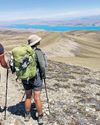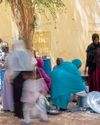
On the night of 13 March 1781, William Herschel was peering through his telescope in his back garden in New King Street, Bath, when he noticed an unusual faint object near the star Zeta Tauri. He observed it for several nights and noted that it was moving slowly against background stars. The astronomer first thought he had found a comet but later identified it, correctly, as a distant planet. Subsequently named Uranus, it was the first planet to be discovered since antiquity. The achievement earned Herschel membership of the Royal Society, a knighthood and enduring astronomical fame.
Studies have since shown Uranus to be an odd world. While the rest of the planets within our solar system spin like tops, Uranus lies on its side. And, although it is not the farthest planet from the sun, it is the solar system's coldest.
Uranus also endures seasons of extraordinary magnitude. Each pole spends decades bathed in non-stop sunlight, then decades of total darkness. For good measure, Uranus is the only planet to be named after a Greek rather than a Roman god. (Uranus was the grandfather of Zeus.)
Surprisingly little effort has been made to get up close to Uranus. Only one robot probe has visited - in 1986when the US Voyager 2 craft swept past on its grand tour of the solar system. It revealed a massive, featureless, pale blue world with an atmosphere of hydrogen, helium and methane, a rich family of moons and a powerful magnetic field. And that has been that.
Such slight regard is about to change. The US National Academy of Sciences this year published a report that urged Nasa to launch a Uranus probe as its highest-priority flagship mission for the next decade. The academy publishes a report on US priorities in planetary exploration every 10 years and each decadal survey carries enormous clout - which means Nasa is now under huge pressure to design and fund such a mission.
This story is from the July 22, 2022 edition of The Guardian Weekly.
Start your 7-day Magzter GOLD free trial to access thousands of curated premium stories, and 9,000+ magazines and newspapers.
Already a subscriber ? Sign In
This story is from the July 22, 2022 edition of The Guardian Weekly.
Start your 7-day Magzter GOLD free trial to access thousands of curated premium stories, and 9,000+ magazines and newspapers.
Already a subscriber? Sign In

I love travelling Europe by train, but a joined-up approach is needed
Last August, I took the train from Trieste to Ljubljana, following a route once used by the Orient Express.

How will 2025 turn out? The life of Jimmy Carter offers us a clue Jonathan Freedland
How will we look back on 2025? Or, if that seems too absurd a question to ponder just a few days into the new year, how might we view the first quarter of the 21st century? As it happens, the answer to both questions is the same and it was confirmed by an event that came as the old year faded and the new one began.

15 ways to overcome overwhelm
Readers and wellbeing experts share tips on corralling chaos and avoiding anxiety, from journalling to cherishing nature

Overwhelmed? Here's how to fix it
Modern life is exhausting. Here, Guardian writers explain what they have given up to make space in their schedules and lives from social media to makeup to news addiction. Then, readers and experts offer tips on how to navigate the demands and pressures we all face. First, Emine Saner examines why we are so overwhelmed

Seoul standoff Impeached president fights on despite arrest attempt
South Korean anticorruption officials attempting to arrest the country's suspended president, Yoon Suk Yeol, must know by now what he meant by his repeated vows to \"fight to the end\".

'Don't feed the troll': European leaders hit back at Musk
When the German chancellor, Olaf Scholz, was asked in an interview about the barrage of insults being directed at him and other German leaders by Elon Musk, the world's richest man, his reply was: \"Don't feed the troll.\"

History lessons The two steps that could stop societal collapse
Academic Danilo Brozović says studies of failed civilisations all point in one direction-the need for radical transformation to survive

"Trail angels' The locals offering help and hope to weary hikers
Donna Barkley was weeks into walking New Zealand's longest hiking trail when her strength started to falter. Starting at the northern tip of the country in mid-October, the American hiker had trudged south along vast empty coastlines, over farmland and through dense forests thick with mud.

Community lifeline for millions displaced by civil war
Each day, bowls are set down on the ground in a line outside the community kitchen in Sururab, 40km north of Sudan's capital, Khartoum, for the 350 families who eat there.

Attempt to tackle 'shoebox housing' runs into trouble
Authorities are seeking to fix the problem of tiny, overcrowded housing but critics say new regulations fail to address the worst offenders